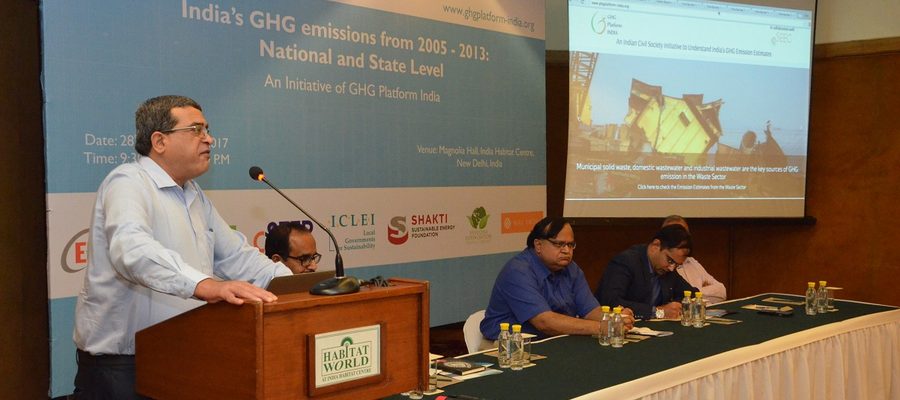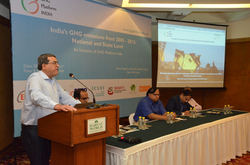Civil Society and Government representatives applaud the second series of India's independent GHG Emission Estimates

The GHG Platform India launched its second series of independent estimates and analysis of India’s GHG emissions, covering the period 2005-2013, at an event held on the 28th of September, 2017 at the India Habitat Centre, New Delhi. The estimates launched include national-level GHG emissions as well as emissions for the states in India across key sectors such as energy, waste, industry, agriculture, livestock, forestry and land-use and land-use change.
The GHG Platform India is a collective civil society initiative that was formed two years ago and involves notable institutions such as Council on Energy, Environment and Water (CEEW), the International Maze and Wheat Improvement Center (CIMMYT), Center for Study of Science, Technology and Policy (C-STEP), ICLEI Local Governments for Sustainability, South Asia (ICLEI South Asia), Vasudha Foundation, and World Resources Institute (WRI) India. The platform was jointly conceptualised by Shakti Sustainable Energy Foundation and Vasudha Foundation, which also acts as the Secretariat for the platform.
With over 55 registered participants, the event was well represented with participants including Government officials from relevant departments of Madhya Pradesh, Punjab, Uttar Pradesh, the Ministry of Environment and Forests and Climate Change, and the Petroleum Conservation Research Association as well as civil society representatives and sectoral experts.
Dr. Bhatt, in his keynote speech, expressed his support for the initiative and noted it was encouraging that technical experts from the civil society have engaged such an independent estimation exercise.
"As we are developing, there are conventions and there are worries about what we are doing to our atmosphere . The MoEFCC has always thought that the GHG inventory is a means to crosscheck where the country stands in this regard. This initiative is a good practice of quality assurance and quality control for the official GHG inventories.” he added.
Mr. Emani Kumar, Deputy Secretary General – ICLEI (Global) and Executive Director – ICLEI South Asia, started with sharing ICLEI South Asia’s contribution to the waste sector estimates, and how things have changed in the recent years.
"ICLEI South Asia has prepared the emission estimates for waste sector at the national and state-level. Waste generation as well as its management and processing technologies used have been changing in the country over the years. We have incorporated these aspects in the estimations. I am glad to hear Dr. Bhatt encouraging us and offering support to take our activities forward,” he said while speaking on learnings from collaborating on the Platform and opportunities ahead.
Dr. Ashish Chaturvedi, Director, Climate Change, GIZ India – shed some light on the data and the estimates, and said that we are as responsible as the government is about the data.
"The question is how do you open yourself to processes. There are specific guidelines available for emission estimation. It is also important to give suggestions back to the MoEFCC. Where is the data going to come from, who will finance it – all these questions are to be addressed," he pointed out.
"The State inventories are a welcome addition. The data could be well-used in the State Action Plans on Climate Change and NDC implementation going forward," said Dr. Ajay Raghava, Deputy Director, MoEFCC.
Dr. Lokendra Thakkar, Senior Scientist, EPCO, Madhya Pradhesh said, "It is interesting to see the state-level estimates and analysis under the initiative. I would like to extend support to further work with us for state-level data for Madhya Pradesh in the future activities of the Platform."
The session included sectoral presentations on Energy Sector estimates by CSTEP, Industry Sector estimates by CEEW, AFOLU Sector estimates by Vasudha Foundation, and Waste Sector estimates by ICLEI South Asia. This was followed by discussions led by panelists on the utility of the platform and linkages to policy action going forward. The results and findings of the platform were well received by both the civil society representatives and government officials who expressed their appreciation for the rigorous and high quality data being placed in the public domain.
Mr. Krishan Dhawan, CEO of Shakti Sustainable Energy Foundation concluded the event with great appreciation for how well the platform was accepted. He thanked MoEFCC and the State Government representatives for their support.
"We will take this initiative forward with enthusiasm. Hope that these publicly available and transparent national and state estimates are widely used by the government as well as the civil society," he added.




